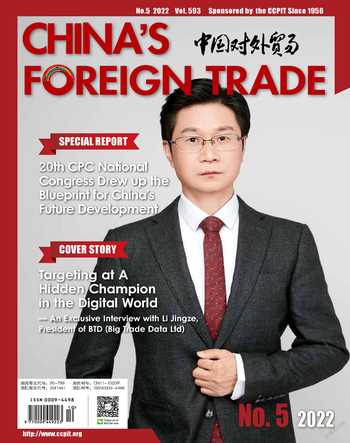China(Xinjiang)-Kazakhstan Entrepreneurs Forum Held
CCPiT
China (Xinjiang)-Kazakhstan Entrepreneurs Forum Held
On September 20, the China (Xinjiang)-Kazakhstan Entrepreneurs Forum was held both online and offline. Ren Hongbin, Chairman of the China Council for the Promotion of International Trade, attended and addressed its opening ceremony online, and CCPIT Vice Chairmen Zhang Shenfeng and Yu Jianlong also joined the Forum.
Ren Hongbin explained that President Xi Jinping, together with President Kassym-Jomart Tokayev, drew up a new blueprint for China-Kazakhstan relations when paying a state visit to Kazakhstan the other day. Over the past 30 years, since the establishment of China-Kazakhstan diplomatic ties, a leapfrog development in the relationship is evident. As pioneers of the Belt and Road Initiative (BRI), China and Kazakhstan have implemented a series of strategic cooperation projects, exemplifying a new model for win-win cooperation in the international community. The two countries business communities should continue to pioneer Belt and Road cooperation, prioritize production capacities, trade, agriculture and infrastructure building, and vigorously foster new growth drivers, such as AI, big data, digital finance, e-commerce and green energy, so as to jointly safeguard the multilateral trading system and continuously inject new impetus into China-Kazakhstan relations, as well as international economic and trade cooperation. The CCPIT will continue to strengthen cooperation with Kazakh business institutions and build more platforms for pragmatic exchanges and cooperation in order to deliver more solid outcomes in China-Kazakhstan economic and trade cooperation and to contribute the CCPITs strength to the high-quality development of the BRI.
Co-hosted by the CCPIT, the Peoples Government of the Xinjiang Uygur Autonomous Region and the Embassy of Kazakhstan in China, the Forum was not only a major economic and trade event of the 2022 China-Eurasia Expo, but also a practical measure for the CCPIT and the Peoples Government of the Xinjiang Uygur Autonomous Region to jointly implement the significant consensus reached by President Xi Jinping and President Kassym-Jomart Tokayev.
The Forum was held with the theme of “See Cooperation, Promote Development, and Create a Future Together”. Ma Xingrui, Secretary of the CPC Committee of the Xinjiang Uygur Autonomous Region, diplomatic envoys from China and Kazakhstan, and heads of major Kazakh cooperation institutions also attended the Forum and delivered speeches. Guests had an in-depth exchange of views on such topics as “Promoting Regional Integration through the BRI and Building a Community with a Shared Future for BRI Entrepreneurs”, and “Exploring New Trading Channels for Win-win Results and Breaking New Ground for China-Kazakhstan Economic and Trade Exchanges”, and came to a consensus on cooperation.
More than 200 representatives from the Chinese and Kazakh governments and enterprises joined the Forum where 11 cooperation agreements and import/ export contracts worth USD 476 million were signed by both countries enterprises, business associations and chambers of commerce.
China-ASEAN Business Leaders Forum and Special Dialog on RCEP Business Cooperation Held
On September 17, the China-ASEAN Business Leaders Forum and Special Dialog on RCEP Business Cooperation, which was co-hosted by the China Council for the Promotion of International Trade(CCPIT), the Peoples Government of Guangxi Zhuang Autonomous Region and the national chambers of commerce and industry of ASEAN, was held in Nanning, Guangxi Zhuang Autonomous Region. Zhang Shaogang, Vice Chairman of the CCPIT, Liu Ning, Secretary of the CPC Committee and Director of the Standing Committee of the Peoples Congress of Guangxi Zhuang Autonomous Region, Hor Namhong, Deputy Prime Minister of Cambodia, Airlangga Hartarto, Coordinating Minister for Economic Affairs of Indonesia, and Tiong King Sing, the Malaysian Prime Ministers Special Envoy to China and Chairman of Malaysia-China Business Council, etc., attended and addressed the Forum.
Zhang Shaogang said in his speech that this year marks the first year of both the China-ASEAN comprehensive strategic partnership and the implementation of the RCEP. The Chinese and ASEAN business communities have reached a consensus on promoting high-quality implementation of the RCEP, accelerating green transformation and upgrading, and strengthening cooperation in terms of industrial and supply chains. The CCPIT stands ready to work with business communities in all countries to make full use of the development opportunities brought about by the implementation of the RCEP to help with the building of the China-ASEAN Free Trade Area (FTA) 3.0, boost regional economic recovery and resilient growth, and make new contributions to a closer China-ASEAN community with a shared future.
At the Forum, the Progress Report on the ChinaASEAN Business and Investment Summit (2004-2021) and the Business Environment Report of ASEAN 2022 were released, an appointment letter was issued to the China-ASEAN Business and Investment Summit Expert Committee, and the China-Japan-Korea Business Council Guangxi Liaison Office and the RCEP Business Advisory Council China Committee Guangxi Liaison Office were inaugurated.
Figures
1.1 billion
Over the past 10 years, the total installed capacity for renewable energy generation in China rose to 1.1 billion kilowatts, and the generation capacity for hydropower, wind, solar and biomass energy ranks top worldwide, according to the National Energy Administration.
101.6%
In September, the installed capacity of power batteries for NEVs rose by 101.6% year on year to 31.6 gigawatt-hours (GWh), according to the China Association of Automobile Manufacturers.
4%
Power use increased 4% year-on-year to hit 6.49 trillion kilowatt-hours in the January-September period, according to the National Energy Administration.
2.8%
Chinas consumer price index, which is the main gage of inflation, rose 2.8% year-on-year in September, following a 2.5% rise the previous month, said the National Bureau of Statistics.
35,128
Chinas per capita disposable income stood at RMB 35,128 (USD 4,940) in 2021, up 112.8% from 2012. This brought the average annual nominal growth rate to 8.8% over the past decade.
3.94 trillion
Chinas trade in services was valued at approximately RMB 3.94 trillion (USD 550 billion) during the first eight months of the year, surging 20.4% year-on-year, according to the Ministry of Commerce.
39.8%
From 2012 to 2021, the ratio of the digital economy to total GDP expanded from 20.9% to 39.8%, representing an annual average increase of about 2.1%, according to a white paper on the global digital economy released by the China Academy of Information and Communications Technology.
15.1%
According to the report released by the National Bureau of Statistics, in 2021, the industrial output of major hightech manufacturers made up 15.1% of the total value-added industrial output, 5.7 percentage points higher than 2012.
8.3%
I nve s t m e n t i n infrastructure rose 8.3% year-on-year in the first eight months of the year, the National Bureau of Statistics said.
17.1%
About 17.1% urban residents plan to buy houses in the next three months, according to a survey released by the Peoples Bank of China, which is the central bank of China.
3.4 trillion
Official data from the State Taxation Administration showed that Chinas tax refunds, as well as tax and fee cuts and deferrals, had exceeded RMB 3.4 trillion (USD 478 billion) by September 20.
50.1
The purchasing managers index(PMI) for Chinas manufacturing sector came in at 50.1 in September, up from 49.4 in August, showed data from the National Bureau of Statistics.
QuoTes
Chinas price level is basically stable, and the nations central bank will step up the implementation of prudent monetary policy to provide stronger support for the real economy.
— Yi Gang, Governor of the Peoples Bank of China
The best is still ahead of us as we steadily increase our presence and build a sustainable business in China. We are optimistic about the growth prospects of the market and our business as we support financial sector reforms and the opening up of the financial market.
— Toshiyasu Liyama, Executive Managing Director of Nomura Holdings Inc. and Chairman of its China Committee
Chinas export structure has been notably optimized and upgraded, with exports of electromechanical products — computers, vehicles, smartphones and other high-end items — soaring proportionately in foreign trade.
— Sun Xiao, Spokesman for the CCPIT
Chinas growth (in GII ranking) from 34th ten years ago to 11th (in 2022) ... is really spectacular. The close attention paid by the government and the country to innovation as an engine of growth is paying off.
— Daren Tang, WIPO Director General
Compared with fluctuating overseas markets, the pace of domestic economic recovery in China is relatively steady, and various deterministic factors with the policy of stabilizing growth as the main focus are expected to support the continued improvement of the domestic economy in the fourth quarter.
— Wu Mengyin, senior analyst of commodity strategy at Research Institute of Orient Futures
The green industry has made it more important for Chinese enterprises to pursue high-quality development and enter international markets.
— Wang Jiaqiang, Vice-President of the BOC Research Institute
PoLiCies
China to Ensure Implementation of Rent Exemption Policies for Market Entities
China will intensify its implementation of premises rent reductions or exemptions for small and micro-sized firms and self-employed businesses in the services sector, the state-assets regulator has said.
All rent relief policies and measures should be implemented effectively, according to a circular released by the State-owned Assets Supervision and Administration Commission of the State Council.
China has announced that small and micro-sized companies and selfemployed businesses in the services sector that are tenants of state-owned premises in county-level administrative areas classified as medium and high-risk for COVID-19 will enjoy a six-month rent exemption this year, while those in other areas will be exempted from paying rent for three months.
The circular ordered all centrally administrated state-owned enterprises to fully complete their general rent reduction and exemption tasks before the end of November.
All central and local state-owned enterprises should establish supervision and inspection mechanisms, guiding subordinate firms to earnestly implement the policy of reducing or exempting rents, the circular said.
Nation to Accelerate Pilot Program of Market Procurement Trade
In order to develop new forms of foreign trade and cultivate new growth drivers, seven departments of the central government, including the Ministry of Commerce and the National Development and Reform Commission, have jointly issued a circular on accelerating the pilot program for developing market procurement trade, according to an online statement from the MOC recently.
A total of eight marketplaces in provincial regions such as Tianjin, Chongqing, Hebei, Jilin, Heilongjiang and Jiangxi provinces were selected in which to pilot market procurement trade.
Prior to that, the seven government departments had already conducted 31 other market procurement pilot projects, for which supportive policies such as simplified declarations have been applied to facilitate market procurement trade development, the statement said.
The MOC said it will join hands with the authorities concerned to guide the newly established pilot projects to speed up the formation of the implementation plans, build an information network platform and implement supportive policies, continuously improve trade facilitation, promote the sustainable and healthy development of market procurement trade, and help stabilize foreign trade growth while improving trade quality.
China Offers USD 9 billion to Businesses to Maintain Jobs
China has stepped up its efforts to save jobs this year, with some RMB 64.63 billion (USD 9.19 billion) having already been offered to businesses this year.
Unemployment insurance refunds totaling RMB 44.84 billion were given to some 7.21 million enterprises, or more than half of all employers covered by the social security net, in the first eight months of the year, according to the Ministry of Human Resources and Social Security.
The amount of money and the number of beneficiaries were respectively 1.9 and 1.8 times the levels reported for the whole of 2021.
Approximately RMB 19.68 billion in onetime training subsidies was paid to 3.96 million companies in regions impacted by COVID-19 outbreaks and in the five hardest-hit industries, including the catering sector.
In order to help college and university graduates while they seek employment, the government has also provided grants totaling RMB 110 million to 33,000 companies, benefiting some 103,000 graduates.
Chinas 160-million-plus market entities, offering 600 million jobs, form the cornerstone of the economy and are crucial to the stability of employment, according to Zhang Chenggang from the Capital University of Economics and Business.
These pro-employment funds will encourage employers to maintain jobs, shore up business confidence and stabilize the economy, he said.
- China’s foreign Trade的其它文章
- The Development of Foreign Trade in China over Last Decade:Higher-level Opening-up to the Outside World
- New Changes in Travel:Past Visitors Are Become Today’s Experiencers
- China’s Livestreaming Enters A New Phase of Development
- The Pension Industry Calls for New Models and Ecology
- Digital Technology Promotes China-foreign Trade in Agricultural Services
- As Shipping Costs“Dive”,It Is Imperative to Improve the Layout of Industrial Chain

